The Flat Circle of GamerGate
Everything we've ever done or will do, we're gonna do over and over and over again.
In 1887, German philosopher Friedrich Nietzsche - well known for both his comically oversized mustache, a surname that I always have to second check the spelling of, and someone who a lot of people pretend to have read but never actually have - published Die fröhliche Wissenschaft. In English, the title is often translated to The Gay Science; at the time, the turn-of-phrase was common in various European languages as a flowery way of describing the art of writing poetry, which the book is rife with, though, these days, it sounds like something that you could reasonably get a Ph.D. in from any accredited Ivy League institution.
The book is a bit of a grab bag of philosophical musings and poetry alike, and fundamentally Nietzsche in the fact that it’s just weird as shit. From what I’ve read of Nietzsche - which, I’ll admit, I’m not the most well-versed in - this isn’t terribly out of the ordinary. This was written several years before his infamous breakdown in Turin, in which a possibly apocryphal story claims that he went berserk upon seeing a horse being beaten in the streets and threw himself over it to protect it from a mob of incensed Italians, who, being Italian, I assume were just using this poor horse as a pinata for sport, and Nietzsche, being a true Indo-European Aryan Giga-Chad of Germanic stock, felt compelled to save the poor creature due to ancestral memories of riding across the steppes on the back of a noble steed. Then he started openly calling for the execution of the Pope. Did I mention that the guy had syphilis and downed enough opium to kill a bear just to sleep every night? If I had to guess, I’d assume that’s all connected in some way.
Anyways, I’ve never read the entirety of The Gay Science. I’ve never felt compelled to. But, there is one concept that Nietzsche puts forward in the book that I read as an excerpt once that always stuck with me. Well, two, actually, because The Gay Science is the work in which Nietzsche famously postulated that God is Dead. Very original, I know, but, keep in mind, this was, like, 1882 - edgy goth kids were still a century away, at the very earliest, and Nu-Athiest Redditors even more so, so Nietzsche was ahead of the curve on tipping his fedora. He writes -
"'Where is God?' he cried; 'I will tell you. We have killed him—you and I. All of us are his murderers...
I always thought this line was funny. We have killed him - you and I.
We?
Look, bud - there is no we in this equation about murdering God, here. I don’t know about you, Mr. Neitszche, but I didn't do dick. Don’t drag me into your opium-riddled delusions of deicide.
Aside from his chatter of murdering the divine and nervously stroking his mustache over the possibility of living in a world built on the corpse of God, The Gay Science is also the work in which Nietzsche first begins to postulate on the concept of Eternal Return.
Eternal Return or Eternal Recurrence is, to grossly oversimplify the concept, the idea that time is a repetitive cycle. What has happened will happen again. What’s going to happen has already happened, and always will happen. This was a concept that was not proprietary to Nietzsche. The concept of a sort of cyclical history can be found in some form or another in almost every ancient spiritual system we’re aware of, and, by that token, I’d be so bold as to say that it has underpinned almost every human understanding of spirituality since the first monkeys tripped on some goofy shrooms and started contacting fifth dimensional machine elves.
I mean - if you believe it played out that way. Which I don’t, but, hey. Who knows.
The civilizations of the Indus Valley have long subscribed to the concept of the Maha Yuga, in which the universe is destroyed and subsequently recreated every couple million years. Given that we are clearly, demonstrably, and undeniably in the Kali Yuga - the age of darkness, strife, chaos, and rampant stupidity - I’m inclined to give this theory some credit.
Further still, this can be seen in the myths of the Greeks, the Norse, the Japanese, the Mayans, and more, all of whom tell stories of cycles in which pantheons of Gods are born, live, die, and take the world with them when they go, only for it all to be reborn again from a seed. Ragnarök may be the end of this world, but after the mighty Fenrir swallows the sun and the nine realms are torn asunder, Líf and Lífþrasir will emerge from their arboreal panic room and start the cycle anew. The Titans of Ancient Greece were overthrown by the Olympians, who in turn, one day, will likely be overthrown themselves, and, whoever dethrones them will be done away with in time as well. Even in Christianity, the earliest thinkers of which vehemently argued against an idea of such a concept, the destruction and devastation of Armageddon will give way to the Millennial Kingdom and a golden age of Heaven on Earth.
The end is never the end - just another beginning.
While Nietzsche was not the first of his contemporary thinkers to play the concept, which became something of a hot topic in lieu of the codification of the Laws of Thermodynamics, he was perhaps the first to popularize it. Even though it was already making ripples in the world of Deutschophone philosophers, Nietzsche took the concept and brought it to prominence - curiously, right after he began a deep dive into Indian religions and spiritual studies. In what is arguably his most revered work, the seminal Thus Spoke Zarathustra (which would later go on to be immortalized by Richard Strauss in his famous tone poem, and more importantly, when it was used as Ric Flair’s walk on song), he mentions something close to this concept, but Nietzsche first toyed with the idea in earnest when he wrote the following in The Gay Science:
What if some day or night a demon were to steal after you into your loneliest loneliness and say to you: 'This life as you now live it and have lived it, you will have to live once more and innumerable times more' ... Would you not throw yourself down and gnash your teeth and curse the demon who spoke thus? Or have you once experienced a tremendous moment when you would have answered him: 'You are a god and never have I heard anything more divine.'
Out of all the bits and pieces I’ve read of Nietzsche, this one was always the one that lodged in my head. Mostly because, in my loneliest loneliness, it would be nice to have some company - even if they were a demon. Especially if they were a minxy succubi a two-piece latex swimsuit, but that’s neither here nor there. More to the point, frankly, it’s fucking terrifying. The idea of some demon creeping through your window to tell you that you’re doomed to repeat your life as you’ve lived it is not a pleasant thought. I don’t know about you, but I have not been living my best life, as the kids these days say, and if I have to do all this shit again… well, I suppose there’s a futility to struggling against the cosmic laws writ into the fabric of reality, but you’d best bet I’d fist-fight the Demiurge if it meant there's even a fraction of a chance I don’t spend the rest of eternity cycling through a revolving door of office jobs. Which, if you’re real, and you’re reading this -
Square up, homie. You’re not putting me through this shit again, man. Not without a fight. I know the classical means of escaping the cycle of Samsara is enlightenment and meditation, but you’d best believe I’m gonna scrape and claw my way out of it if I can. And, even if it’s an endeavor doomed failure, I can take solace in the fact that, if nothing else - I still tried.
And isn’t that what Nietzsche’s ubermensch schtick was about? The graduation from that nice, placid, and comfortable house upon a lake and scaling the mountains of uncertainty, unrest, and solitude?

Unfortunately, whether it’s a metaphysical, cosmic law, or just history’s curious tendency to rhyme, there does seem to be some merit to this concept. As stated, pretty much every human culture and spiritual system has, at some point, cued into the feeling that, even if things don’t play out on a one-to-one repetition, there is a cyclical, self-perpetuating nature to the universe. Even the math bears it out - in an infinite system, if something happens once, it is a statistical guarantee that it will happen again, exactly as it did before. In fact, it would be statistical impossibility that it wouldn’t.
If you ever watched the first season of HBO’s True Detective, you’ve heard the concept distilled both poetically and succinctly by a grizzled Matthew McConaughey, illustrated beautifully with a crushed Lone Star tallboy.
More than ever, it does feel as if we’re stuck in the flat-circle of a flattened can of Lone Star. Everything we did, we’re doing again. The ouroboros has turned and begun to gnaw at its tail once more. Chaos reigns across the country. The same two octogenarians from the previous election cycle are once again pit head to head in the very same race. Russophobia not seen since the height of the Cold War is the order of the day.
Old battlefields of the culture war, long dormant, stir with life. Faces and names from a past chronicle reemerge from dark corners. The world of gamers quakes with the familiar rumblings. Old soldiers take their weapons out of dusty storage bins as, once again, an old specter of one of the culture wars most spectacular and destructive episodes stalks the social media landscape. The cycle turns once more.
In February of 2024, Rocksteady Studios published the video game, Suicide Squad: Kill the Justice League. A month on, the fallout is still settling. It may be premature to declare it the worst disaster in the gaming scene of 2024 so early on into the year, but if anything is going to top just how poorly this mess flopped, it’s going to have to try, and it is gonna need to be firing on all cylinders of suck to succeed.
Since I wrote about the catastrophic launch of the game and the resulting shit-show, the raging dumpster fire has escalated into an unmitigated five-alarm inferno. The game has continued to hobble along in a state that is hardly playable, so much so that as I write this, Sony has begun to issue full refunds to anyone who bought the game. DC’s leash-holders, Warner Brothers, have officially declared the game to have fallen short of expectations, which is tantamount to calling a gunshot a minor inconvenience. After very publicly gearing up for a future dedicated to live service games, of which Suicide Squad was supposed to be the first success of many, the game’s failure to launch has forced the company to completely reorient their entire strategy for the future in a violent and humiliating u-turn, with CEO David Zaslav saying that they will now shift focus away from Triple A console gaming and instead place a greater emphasis on mobile games, which are cheaper and easier to make, sustain, and, most importantly, monetize with microtransactions. When one takes into account that another Warner Brothers’ game, Hogwarts Legacy, was one of, if not the biggest game of 2023, this dramatic change in direction is all the more unbelievable. As of January 2024, Hogwarts Legacy has sold over 24 million copies. The game made over a billion dollars in revenue within months of release, and has probably raked in another billion since. That is no mean feat.
And yet, despite the absolute juggernaut that game turned into, Suicide Squad: Kill the Justice League has single-handedly undone that entire victory. If Suicide Squad was dead on arrival, the corpse has since spontaneously combusted and collapsed into a black hole that is currently hoovering up the contents of Warner Brothers' bank accounts. The entire endeavor is a sucking wound in Warner Brothers’ chest, and the delayed release of fan favorite Joker as a playable character at the end of March will most likely only add further gasoline to the raging fire. After all, this isn’t the iconic Joker of the Arkham series - he’s dead. No; this is yet another uncreative, uninspired, and laughably lame re-imagining of the character that comes from another fucking universe - because the multiverse bit isn’t already played out enough - who the staff at Rocksteady Studios, in their wisdom, have described thusly:
Jared Leto’s god awful take on the character had more dignity than this. Not by much, though. Maybe, like, a picogram more.
The factors that contributed to the total failure of Suicide Squad: Kill the Justice League are manifold. First and foremost, it sucked. Taken on the merits of being a game alone, it was terrible. Buggy. Glitchy. Ugly. Boring. Repetitive. Not fun in the slightest. Even if it had been a game that offered slightly more fun than tweezing out every one of your nose hairs one by one, the story it told would have doomed the game to a fate in the rubbish bin, only to be bought at a steep discount during the Steam Summer Sale, or perhaps given away as a freebie by the Epic Games Store or Playstation Plus, where it would doubtlessly sit in most libraries, untouched and neglected to grow mold. It was, after all, the story, first and foremost, that ignited the controversy around the game that’s still smoldering. Whether it was the flagrant disrespect shown towards the heroic pantheon of DC’s Justice League, the pitiful attempts to subvert audience expectations with shocking twists that have become so rote and routine that they can be mathematically predicted with the accuracy of eclipses, and miserably mirthless attempts to crib the zany, irreverant humor of the Guardians of the Galaxy, of which I’d argue DC’s has been trying to ape with the Suicide Squad since their first flop of a theatrical outing, the game’s story rubbed a whole lot of people so far in the wrong direction that dedicated DC fans were practically issuing fatwas for the writing staff at Rocksteady Studios.
Though most of the blame could probably be placed squarely at the feet of Rocksteady Studios’ amateur writing staff, which seems to possess a collectively poor grasp on the concept of comedy, adventure, action, and even the fundamental basics of storytelling, they don’t shoulder all of it. Their efforts were aided and abetted by the Montreal-based outfit, Sweet Baby Inc.
As stated in my previous article, Sweet Baby Inc. sounds like it should be some sort of small, independent confection producer, or the name of an escort service that panders to men of questionable taste, but the company is, in their own words, a narrative development and consultation studio. Specifically, they specialize in what the industry calls sensitivity consulting, and employs sensitivity readers. In the hyper-politicized entertainment industries of the West, these individuals have been making a mint in recent years, being hired by studios and creative outfits to come in and basically proof-read their products for wrong think in exchange for fat checks. If you ever wondered why the entertainment landscape looks the way that it does and almost everything being pumped out by the big names of the industry suck, these people play a big part in answering that question.
If you’ve never heard of a sensitivity reader before, you’re in good company. Most people haven’t. Like any predator or parasite, they do their best work when they’re unseen and undetected. There’s a reason a hunter doesn’t go out into the woods wearing bright neon clothes and clown shoes that honk with every step they take. There’s a reason tapeworms aren't sending you a letter of intent when they take up residency in your bowels. Once the presence of sensitivity readers is known, measures can be taken to avoid them - namely by not buying the products with their names attached to them, or their influence exerted over. And, up until now, most of them have operated in relative obscurity. Sure, some segment of consumers were aware of their presence, but you had to do some digging to find out what they had infested and, much like a worm-eaten apple, it wasn’t until you bit into it and got a nice, juicy mouthful of worm guts that you’d even realized that they were there to begin with.
Despite working on some of the biggest titles in gaming over the past couple years - Spider-Man 2, God of War 2, Alan Wake 2, and many others - Sweet Baby Inc. has largely flown under the radar and continued to work both unseen, unmolested, and at a furious pace. They weren’t exactly hiding the fact that they worked on those titles; each of them were, until very recently, proudly advertised on their website. But, at the same time, they weren’t going out of their way to advertise their involvement or contributions. If you knew, you knew, but if you didn't - even better. And that was exactly how they wanted it.
It didn’t take long for keen-eyed observers to pick up on the fact that they had helped - or perhaps hindered - the development of Suicide Squad: Kill the Justice League. The game was added to their site's trophy room of taxidermied heads that they’ve collected over the past few years, only to be quickly and quietly removed within hours of the game’s release. As news of the games catastrophic launch spread across the social media landscape like a wild fire, they feverishly worked to scrub their fingerprints from the crime scene. However, they couldn’t revise their names off the games credits. Like photos taken from a security camera recording the scene of a crime, they were caught dead to rights, and no alibi was going to explain away why they just happened to be standing over the body with a length of lead pipe covered in blood, viscera, and brain matter.
Within days of the kerfuffle kicking off, the Sweet Baby Inc. twitter page was locked down. It seems that the course of action that they decided on was to hunker down, keep their faces out of the spotlight, and pray for the controversy to blow over and for another trash-fire to ignite and take eyes away from them.
In my previous article, I stated that gamers are a notoriously forgiving bunch. Much like any good brainless consoomer, many of them are willing to continue to line up and get a nice, hard slap across the face from big studios, Triple A developers, and their cronies, in some vain hope that, maybe, the next time they fork over their hard earned money, they’ll be given a piece of candy instead of a drubbing. And I stand by that. The consoomers’ exceedingly high tolerance for abuse cannot be discredited. It’s the only reason that Disney’s Star Wars continues to limp along. It’s the reason that every mainline installment of the Pokemon franchise is more buggy and less well-made than the last. It’s the reason that Marvel Comics are able to publish flop after flop and, somehow, still keep squeezing out more.
However, not every gamer is such a glutton for punishment. For every dedicated consoomer that is willing to line up for another helping of slop at their own detriment, there are more savvy customers that are more discerning. Customers that don’t appreciate being spit on by the crowned heads of the industry. As the old Bushism goes - fool me once, shame on — shame on you. Fool me — you can't get fooled again.
Again, as I stated in my last piece, there’s a serious lack of consumer awareness about what products these sensitivity consultants work on. They have a vested interest in keeping it that way. If consumers are alert to their presence and opt not to buy the products that they’ve meddled with, then they’re out of a job. Unfortunately, parsing out what all they’ve worked on takes some effort. More than most are willing to put in. Often times, the only evidence that Le Doux Bébé has graced a project with their odious touch is a name or two in the novel-length staff roll at the end of the game that almost no one will read and even fewer will study and scrutinize, or a one-off tweet by one of their employees, who are apparently nothing if not masters as covering their tracks. Still, if you’re willing to put in a little legwork, you can find a soiled diaper or two left behind by these infantile miscreants. But who among the gamers has the stomach to do such work? Is there a worthy gumshoe or hawkshaw willing to plunge their hands into the smelly muck and sift through the refuse to find these traces of wrongdoing?
As it turns out, there was. And, like many a hero, they came from the most unlikely of places. Deep from within the sun-soaked tropics of glorioso Brasil, the protagonist of this tale emerges; a man known only by the appropriately hyper-masculine psuedonym, Kabrutus Rambo.
Though yeoman’s work was done by denizens of the internet’s open-air sewer of 4chan to uncover the tracks of Sweet Baby Inc., as they once again weaponized their autism to root out their presence in a variety of games heretofore unknown to harbor their rot, Kabrutus took it upon himself to shine a light upon their deeds for all to see. This brave Brazilian lit a beacon and took 4chan’s work to the one place that nobody at Sweet Baby Inc. would ever want their handiwork to be advertised - Steam.
Steam, for those unaware, is a video game distribution platform and digital store operated by the august Valve Corporation of Seattle. It is one of, if not the largest video game distribution platform and retailer. Up until recently, with the launch of the Epic Game Store, it was the de facto PC gaming platform, and something of a hub for gamers. Even now, it remains so, and the day that the oriental monster that is Tencent stops pumping unlimited Beijing Bucks into the Epic Game Store to keep it afloat is the day that they once again remain alone and unchallenged.
The Steam Digital Storefront allows users not only to rate and review games, but curate them into collections. Basically, if you like one game, you can curate a list of similar games that other prospective buyers can use to easily find other games that might appeal to them. As of a few days ago, Kabrutus took to the platform and began to curate games that were discovered to have a little bit of da Baby in them.
And, no - not that DaBaby.
Though, I certainly don’t want to touch anything that guy’s had his mitts on, either. Not without a hazmat suit and a kevlar vest1, at least.
No - Kabrutus wasn’t concerned with the happenings or goings on of a rapper who’s brief career is already (mercifully) on the backslide. He was hunting for babies of the sweet variety. On the store, he established the collection, Sweet Baby Inc Detected. With Suicide Squad’s continued floundering still very much in the public eye, what with Warner Brothers desperately trying to run damage control and bad news upon devastating news constantly rolling out, the collection was quick to garner attention. Within days, it had well north of a hundred thousand followers, which continues to swell precipitously by the day.
Perhaps most impressively of all, Kabrutus left a negative review for each and every game. Unlike every Youtuber that’s covered the topic, who seem to be more interested in spouting off hyperbole and screaming and slobbering all over themselves about da Wokies for easy clicks instead of, y’know, actually doing anything about it, Kabrutus simply left links to conveniently archived evidence that detailed Sweet Baby Inc.’s exact involvement in each and every one of these games. If you didn’t believe him, the results could speak for themselves. The man came ready, and he came with receipts.
Obviously, this shot across the bow did not go unnoticed by the S.S. Sweet Baby’s crew. A narrative designer working for the company - and what exactly that position entails is as much a mystery to me as it is to you - named Chris Kindred was quick to see that his handiwork was suddenly being broadcast for all the world to see.
The people at fandompulse.com helpfully compiled these tweets which are now conveniently hidden behind Kindred’s locked Twitter account, more of which can be found at this article.
So far as I can see, the only code of conduct or terms of services that are being breached here is by Kindred, who’s using Twitter to incite harassment against Kabrutus for the crime of, uh… um…
Oh. Right. Raising consumer awareness. Which, last time I checked, is actually a good thing, especially in a world where corporations look to swindle, hoodwink, and generally con consumers into buying shit they don’t want, don’t need, and wouldn’t like, by any means necessary. Consumer advocacy is, in my opinion, one of the of paramount issues of importance of our time, and one of the only reasons that we aren’t swimming in radioactive factory run-off, insulating our houses with asbestos, or popping out thalidomide babies left and right. And, to be clear, big corporations are still absolutely, quantifiably, and undeniably still out and out poisoning us, stiffing us out of money, and expecting us to say thank you for the privilege, but things would be a whole lot worse if brave men and women weren’t willing to, like Kabrutus, stand up, take charge, and bring the fight to their doorsteps.
People deserve to know what goes into the product they buy. People deserve to know what they’re buying before they fork over hard-earned cash, accrued by long hours of effort, to get it. They deserve to be informed. An informed consumer is a judicious one. And only someone with something to hide and acting in bad faith is going to be afraid of an informed consumer.
The battle between Kabrutus and Kindred was brutal, but swift. Within a matter of days, it was settled, decisively. Kindred has crept back into the shadows, batting down their social media and, much like the company he works for, no doubt hoping to wake up and find that some bigger shit-show has erupted to take eyes off him. Kabrutus, on the other hand, seems to be handling it all rather well.
Another character who popped up in this debacle was a Twitter user known by the handle Legobutts, who is another consultant with Sweet Baby Inc.
This individual is Maya Felix Kramer - and no, I’m not divulging anything that isn’t already public knowledge. A decade and some change ago, Kramer was one of the central figures in the Progressive camp of GamerGate. If GamerGate was the Trojan War of the gaming hobby, Kramer would have been a Sarpedon or Glaucus - maybe not on the same tier as Hector or Paris or Aenaes, but certainly a noteworthy figure among that side of the conflict. In fact, if we’re going to run with the Trojan War parallels, they have ties to GamerGate’s Helen - the woman who started it all.
That’s her. The face that launched a thousand shitposts. The one that men, women, and enbies across the internet descended into the trenches of Twitter, 4chan, Reddit, and beyond to engage in the most heinous online combat to ever disgrace the internet, whether it be to see her held accountable for her actions or uphold her honor. If there’s one singular face that I believe can be blamed for the tectonic cultural shifts in the video game industry and the greater online culture as a whole - that’s the one.
Her nom de guerre is Zoë Tiberius Quinn, which is so colorful that you probably don’t need to be told that it's a pseudonym. Her real name is Chelsea Van Valkenburg, of New York, which is a name she’s done just about everything to erase from the internet. Her story is a long and sordid tale unto itself, one too long, too complicated, and too rife with misinformation spread from both sides to get fully into right now. If you were around to see GamerGate unfold in real time, you already know who she is, and you probably have a rather good idea of what she did to set off the cultural conflagration that continues to define this generation.
GamerGate was not so much a cultural event so much as it was the explosive ignition of kindling that had been building up in the underbrush of the gaming scene for years. In a lot of ways, the build up resembles the ramp up to World War I - even though there were many, many disparate factors that moved many disparate parties on similar trajectories that would ultimately culminate in a slow-motion train wreck as they converged, it was an Austrian duke getting merc’d by some no-name Serbian terrorist just happened to be the one event that served as the easily-identifiable flashpoint that started the cascading series of events that ended with the Great Powers of the day throwing millions of men into battlefields to fight and die. It didn't have to be, though. Tensions were so high that it could have been any number of other flare-ups around the world that could have been the unfortunate roll of the die that set it all in motion. It just so happened that a blog under the name of The Zoe Post published by independent game developer, Eron Gjoni, alleging Quinn’s sexual infidelity during the course of their relationship, was the one spark of many that managed to take.
What should have been an unflattering exposure of one woman’s private life that very few should have taken interest in instead devolved into a disaster for almost everyone involved with knock-on effects that have since reshaped the cultural landscape of both gaming culture and the internet as a whole. But, had it not been that, it would have been something else. The industry - especially the indie gaming wing of it - was rife with contention and charged with hostility. Despite the common narrative that the GamerGate opposition faction that they just wanted to be left alone, I’m not entirely sure that’s true. I believe that the general gaming public did want to be left alone to play their games and not be worried about political purity tests. That has been demonstrably proven. But not all of them. The Progressive Bloc had been making in-roads for years and hacked out a prominent space for themselves in the gaming space. At that point, and had garnered a laundry list of enemies that were raring for a fight. Even though the entire event looks like a well-organized, unified cabal of Progressive ideologues pitted against a rag-tag coalition of scrappy no-names on YouTube and 4chan from a bird’s eye view, I think that the ordeal was more of an ideological power struggle by the elites of the gaming space that was masked by the low-level squabbles that were waged on platforms. True to the nature of war, the plebeians butcher each other in the fields while the men who stand to benefit from it all surreptitiously negotiate in dark rooms.
Now, Quinn’s connection to Kramer is an uncertain one. Some sources state that they were in cahoots the whole time, with Kramer running PR for Quinn and her various organizations during the worst of the fighting. Apparently, Kramer’s Patreon page at the time listed Quinn as a developer that they had worked with. Quinn and Kramer both claim to have never worked with one another in any professional capacity. If there’s any other evidence to the contrary aside from this, it’s since been lost in the murky waters of misinformation that suffuses the entire fiasco. The validity of these claims by Quinn and Kramer are entirely up to you to decide - in the absence of hard evidence, I defer to ambiguity.
However, the two are most certainly acquainted personally. In 2014, the two openly gloated on Twitter together about collaborating to DDOS attack the website of The Fine Young Capitalists, which was one of the many belligerents in the conflict. More damningly, one of the several people that Gjoni claimed Quinn had cheated on him with was Kramer. Again, the validity of Gjoni’s own accusations have been called into question over the years, so make of that what you will.
It’s also been alleged that the two were driving forces behind the Alec Holowka episode. In 2019, Quinn very publicly accused Holowka of physical, emotional, and sexual abuse during the brief time they cohabited in 2012, a whole seven years after the fact and despite seemingly maintaining an amicable relationship with her since they split. To see her turn on a staunch ally during the worst of GamerGate so rapidly and mercilessly suggests to me that there is more to the story and the inter-personal drama between the two, but, ultimately, we’ll never know, and it doesn’t really matter; the end result was the same. Within a day of the accusations coming to light, Holowka was summarily fired from the video game studio he’d helped found2, and, only two years after becoming an industry darling with his game Night in the Woods, had become a pariah quite literally overnight. Four days later, Holowka was dead by his own hands. There has been no shortage of accusations accusing Quinn, Kramer, and others in their circle of privately harassing Holowka up to the point that he chose to take his own life, or at the very least using their connections and influence to make him unemployable, but, again - we can’t be certain. Here’s a poignant piece that takes a closer look at the entire lurid affair, if you want more details, especially those that give Holowka the benefit of the doubt that he was not granted during his life.
Kramer in particular has plenty of verifiable skeletons in her closet. During the height of GamerGate, she doxxed multiple people on the opposite side of the conflict, and was directly responsible for using her industry and personal ties to drum out members in the scene who she found to be disagreeable. There’s no need to dwell on allegations with little to no evidence when she’s committed well-attested crimes and misdeeds. This is all to say that Kramer is not someone you want to rub shoulders with.
Kramer also has ties to another infamous figure in the GamerGate story, Anita Sarkeesian, who set the stage for what would come in 2010 with the webseries, Feminist Frequency, and a non-profit activist organization by the same name. Again, her story is another absurdly messy, but, like Quinn, if you were there, you know who she is and what she did. Also like Quinn, she’s dialed back her media presence in the intervening years, with Feminist Frequency as an organization finally coming a long-overdue and ignominious end in August of 2023. During GamerGate, Kramer served in a public relations capacity for Sarkeesian’s Silverstring Media, as well as others, which put her at the front and center of most of the conflict that ensued.
When the extent of Sweet Baby Inc.’s involvement in the Triple A game industry came to light, many were left scratching their heads with confusion. Up until Suicide Squad’s botched release, they were not a well-known organization, and existed largely outside of the purview of the gaming public. Many asked - how exactly did this company worm their way so deep into the industry without attracting any attention to themselves? Even though they’ve been carving out a niche in the mainstream game development scene for years now, given that the three biggest titles they were involved with released in 2023, it very much seems as if they just popped up overnight.
Well, given these newly discovered ties to someone as well-positioned and well-connected as Kramer, it makes a lot more sense.
Part of the issue that GamerGate brought to the surface was the tangled interpersonal relations and incestuous connections of the independent gaming scene that, at the time, had already begun to creep into the mainstream. It blew the lid off this cabal of Progressive activists, and revealed them to be a nasty den of vipers that were equally liable to bite one another when it became convenient to do so. Given this, I’m honestly not surprised that Quinn’s name is once again cropping up in the wake of all this. All the twisted, tangled, convoluted roads of GamerGate always, without fail, seemed to wind up back leading back to her in some manner or another.
After GamerGate proper fizzled out, she’s largely avoided the limelight save for the odd public appearance at a conference or convention here and there, where they trot her out to spout off pablum about strong women in game development or some such. Sarkeesian, too, took a relative backseat over the years, as have Kramer and most of the other most notable names from their bullpen during the GamerGate years.
The thing is that the Progressive Bloc lost the public relations war side of GamerGate. Quinn, Kramer, Sarkeesian - they’re difficult people to like. Even if they didn’t have the baggage and accusations trailing behind them like a naval mine fastened to a mile long chain, their self-righteous, sanctimonious, humorless attitudes made them difficult to stomach. It’s no mystery as to why the hearts and minds of the segment of the gaming community that had not already picked a camp during the conflict broke for the other side. Today, their names command respect only in certain circles. Outside of this tight-knit, insular, and provincial groups within the industry, their names are radioactive. Especially among the laity of the gaming scene. When their names come up in a project or event, you don’t walk away from it, you run. There’s a reason that Sweet Baby Inc. and these characters all prefer to keep a low profile - they know that they’re lightning rods for controversy. They’re keenly aware that their presence is poison.
However, despite losing the public relations front of the conflict, the Progressive Bloc managed to eke out a win on the more important side - the ideological struggle within the industry. It’s easy to mistake the fact that you don’t hear about them much as a sign that they lost the fight in every capacity, but that simply isn’t the case. Quinn is still present in the industry. She never left. In fact, in certain circles, she’s practically royalty. She’s beyond reproach. She doesn’t need to be seen by the public to exert influence. In fact, it’s better for her that she isn’t. It must be painful for someone who seems to be a pathological attention seeker to resign herself to the shadows, but Quinn is nothing if not clever and cunning. She knows how to maneuver herself to stay afloat, and it’s clear that she’s managed to outmaneuver and outsmart most of her opponents. The same could be said of Sarkeesian, Kramer, and others, all of whom managed to keep their careers going in the background with the help of sympathetic Fellow Travelers.
For years, I’ve read that 4chan, gamers, whatever you call the loose coalition of dissenting forces that pushed back against the Progressive Bloc, won GamerGate, if anyone won at all.
I think we’re beginning to see just how not true that sentiment is.
If a Quinnspiracy was what ignited GamerGate to begin with, it appears that another might be boiling just beneath the surface once more. What are her ties to Sweet Baby Inc., exactly? It could be extensive. They could be tertiary. They could be nonexistent. I don’t know. For all we know, this could have nothing to do with her, nor Sarkeesian, or any of the other movers and shakers of GamerGate at all. It isn’t a stretch of the imagination to believe that it does, but, at the same time, all of this information is basically fresh out of the oven, investigations are ongoing, and until more research is done by the internet sleuths on 4chan and Reddit, all we have is baseless speculation.
Now, look. I’ll level with you, here. When it comes to GamerGate, if it sounds as if I’m biased in favor of the opposition, it’s because I am. Slightly. I find most of the people that took up the other side of the argument in defense of Quinn and her cohorts to be an overwhelmingly repugnant crowd. Phil Fish, Bob “KinoRobert” Chipman, Anthony “She Took The WiiU in the Divorce” Burch, Andrew Dobson, Adam Sessler, and others - they’re thoroughly detestable people.

But we need to remember the other side wasn’t a camp of saints, either. The coalition of disparate forces lined up against the Progressive Bloc was a motley one, with little in common except for a common disdain for nagging schoolmarm Social Justice Warriors, as we call them back in the day, and a general disdain for being told what to do or what to think. It was a coarse alliance of convenience, and not much more, which is why it inevitably devolved into infighting, back-biting, and the very same petty, high-school mean girl behavior that typified the elites of the Progressive Bloc’s faction, in time. I know this is painting the Brony community with a broad brush, the fact that they overwhelmingly came over on the side of the opposition says a lot. The fact that most of them now disavow their role in it says even more.
The opposition forces may have had some more friendly, respectable, and likeable faces, but - well, there were plenty that weren’t among their ranks. At the time, most of them poased themselves as being Le Epic Based Saviors of Western Civ, which resulted in a lot of unflattering art that has aged with all the grace of a glass of milk left sitting outside in July. In Phoenix.
In the intervening years, the Epic 100% Wholesome Chungus image most of these men cultivated would fall away, and their true colors would come to light.
If the other side had the blithering slob Bob Chipman, the opposition had Boogie2988. Stephen Williams of Fayetteville, Arkansas, was literally known as The Mister Rogers of YouTube at the time of GamerGate. These days, he’s better known as a manipulative pathological lair that bankrupted himself gambling on crypto and spending multiple six figure sums on escorts and call girls. If not that, then he’s known as the guy who almost went to jail for “firing a warning shot” at a troll who came to his house. While anyone with any sense will agree that said troll should have never even come to Williams’ house, let alone sought him out to begin with, Williams did everything he could to antagonize the troll and goad him into coming, up to literally inviting him to show up at his house on a public livestream him to come and fight him, face to face.
If you keep knocking on doors asking for the devil, don't be surprised when he eventually answers.
Ethan Ralph - better known as The Gunt - is a degenerate alcoholic, chronic petty criminal, and vagabond that made a name for himself covering the GamerGate story on his once wildly popular livestream show, The Ralph Retort. His current situation is hard to discern, given the perpetual category five hurricane of drama surrounding him, but from what I can gather the man is currently on the lam in Mexico after supposedly knocking up a mentally ill eighteen year old he may or may not have kidnapped3. He’s thirty-eight years old, by the way.
Carl Benjamin - often known by his online persona, Sargon of Akkad - gained similar clout during GamerGate and positioned himself as something of a leader among the opposition faction, after being a staple of the Nu-Athiest Skeptic Community for years. Though more respectable than either Ralph or Williams, he’s never quite been able to move beyond that snarky, fedora-tipping affect common to the Skeptic Community’s bigger figures at the time. The guy can’t help himself when it comes to stirring trouble. In a lot of ways, he strikes me as a guy who cause problems for the sake of problems, and enjoys throwing out purposefully incendiary comments just for the sake of stirring the pot. There was also that time Benjamin made the mistake of flashing his Facebook page during a livestream, where messages from his wife were seen where she was threatening to divorce him due to his philanderous behavior. With transwomen. After he spent years vociferously arguing against transexualism.
There was also professional Boxxy-imitator Shoe0nHead - June Lapine - who ended up becoming a prominent figure in the opposition movement by saying pretty much the same things that everyone else was saying… but also being a young woman.
Rightly or wrongly, she was pretty much the token based girl of the group, and managed to accrue a sizeable audience that’s continued to follow her up to today. In the intervening years, Lapine has waffled on her political affiliations. She’s a self-identified Democrat and populist, which, in and of itself, isn’t a problem, but where on the spectrum exactly she falls really depends on the day, which way the winds are blowing on Twitter at the time, who she's romantically involved with, and probably what side of the bed she wakes up on. She's equally chummy with deep-leftist Breadtubers as she is hard alt-right personalities and seems to rub elbows with whatever crowd has the advantageous position at any given moment. She changes her labels with the frequency she changes clothes. One day, she’s a BernieBro Lefty Libertarian, the next she’s an avowed communist - I seem to recall her flirting with anarcho-capitalism and even doing the TradWife schtick for a hot minute, though, to be fair, I don’t follow her, and for all I know, that could have been a comedy bit, or it could have been one of her notoriously public displays of whatever her current partner du jour's sexual paraphilia happens to be. Because that's a thing that's happened. Multiple times.
While I have no doubt that these men believed whole-heartedly in what they were saying during the GamerGate years, Ralph and Williams have proved themselves to be fundamentally unprincipled and unscrupled men that will say and do just about anything for a quick buck or a scrap of clout. Carl and Lapine4, for their parts, seem to have their sincere convictions, but their actions have discredit some of them more than others. Carl is too much of a bomb-thrower and shit-stirrer to be reliable, and, under pressure, Lapine seems to stick to her allies the way MovieBob and Boogie2988 stick to their diets and weight-loss plans.
They’re not exactly people you want to circle the wagon around.
I don’t say all of this to discredit the opposition. In fact, it’s quite the opposite. Just looking at the line up of characters on both sides of the conflict, you can tell by composure, conduct, and appearance alone that it generally consisted of a higher caliber of people. For every belligerent degenerate like Ralph, there was the articulate, insightful, and incomparably witty MrMetokur, then known as Internet Aristocrat. For every Williams/Boogie2988, there was Jon Jafari, who just seems to be an all around likeable, honest, and amiable individual. Make no mistake - I’m sympathetic to the opposition in spite of some of their more checkered members because I believe they were wholly in the right. The Prog Bloc side of the GamerGate spectrum was censorious, authoritarian, and they were needlessly cruel in their campaign to stamp out dissent within the gaming space.
People these days like to wave a dismissive hand and discredit the whole event as a bunch of nerds bickering on the internet. To an extent, this is true. However, those nerds bickering on the internet changed the face of Western culture and touched every facet of every entertainment industry in America. People’s lives were upended, if not ruined, by the fighting. Many people on both sides of the conflict in the games industry and beyond lost their jobs due to their involvement in GamerGate. In Alec Holowka’s case, he ended up losing his life. The ramifications of what many dismiss as just another internet fight were very, very real were not contained to the confines of the internet.
I said my unflattering piece on some of the figureheads of Gamergate’s opposition party not to disparage them. In Lapine and Carl’s case, I don’t even think they’re fundamentally bad people. Morally compromised? Maybe. But wicked people? That might be a stretch.
But you are the company you keep. A group is only as strong as their weakest link, and if your side is courting obese, drug-addicted degenerate petty criminals, pathological liars, and neo-nazi furries… it’s not gonna take much pressure for that chain to snap, and that loose band of tenuously aligned allies to turn on each other like starving pigs in a small pen. Which is exactly what ended up happening.
One of the reasons that the Progressive Bloc lost the public side of the GamerGate conflict was because they had a murderer’s row of quite literally the most infamously unlikable people in the gaming scene lining up to take their side. One of the reasons I suspect that the aforementioned thought-leaders in the opposition were able to style themselves as based saviors of freeze peach despite being thoroughly unfit for the job was because other side was so utterly loathsome. I personally knew people at the time that agreed politically with the Progressive Bloc, but couldn’t in good faith get in line with it because they just did not like the people involved. Also, they were smart enough to know that getting involved in internet slapfights on Twitter was not the best use of their time. Not all of them were as stunningly self-unaware as you might think.
It’s not a popularity contest, I get that, and, as I already explained, I think the Progressive Bloc actually won the battle that really mattered… but public perception doesn’t count for nothing. If you have Ethan Ralph as a self-appointed figurehead for your movement, and he’s getting black out drunk, flashing his gunt, doing drugs, stealing food from gas stations, and kidnapping minors - all on camera - are you going to attract the right kind of people to your cause? Are the right people going to listen to what you have to say? Or they just going to see some idiot like Boogie2988 making an ass of himself and lying through his teeth or literal basement-dwelling hobgoblins posting memes of Twilight Sparkle in an SS uniform and not give you the time of day?
I think it’s important that the GamerGate controversy was, at it’s core, not exactly as it’s been mythologized to be.
It’s almost disturbingly effortless for history to become mythologized as details lost, memories warp to fit and validate one’s perception of events, and apocryphal stories work their way into the lore. Even though much of the cyber-archaeological evidence of GamerGate’s great battle lie scattered and half-buried in obscurity, it’s still there. But much of it has long since been lost to posterity. And more of it is being destroyed, deleted, forgotten, or lost, every day. It’s easy to look back and see GamerGate as some sort of clearly defined, clean-cut conflict between a roster of unquestionably moral White Hats that were lined up against undeniably immoral Black Hats, where one side is good, one side is bad, and you don’t need to think about it that much more. It may be a symptom of Western culture’s over-consumption and media poisoning. It may just be human nature to over-simplify incredibly complex situations and distill them down into easy-to-digest caricatures of themselves, often times in a way that flatter their own sensibilities. It may be something of both.
And, again - I do think that one side of the conflict was in the right. But it’s important to remember that not every actor on that side was a person of upstanding character, and not all of them acted in ways that backed up the claims that they said they posited themselves as champions for. I hesitate to call the aforementioned opposition figures grifters outright, but, given their track records, it may not be wholly inaccurate. For some more than others. It was a bad call to rally around some of these people when they posited themselves as leaders, and one that we’re still paying the price for today, since I doubt losers like Boogie2988 and Ralph would even be relevant presently if not for their integral roles in GamerGate. The same can be said of the other side, too - if they had rallied around more respectable, articulate, and general more likeable people with some iota of charisma, they wouldn’t be remembered with such vitriol and venom, or been so easily characterized as the villains of the story.
I guess what I’m trying to say is that someone may say the right thing at the right time because it’s politically expedient - and that’s good - but you also need to be judicious in who you choose to you align yourself with. This doesn’t just go for some sort of intangible cultural conflict; they’re good words to live by. Like I said - you are the company you keep. So keep good company. It’s better to have a small group of quality friends than a large group of individuals of questionable trustworthiness who don’t really like each other to begin with. Numbers count for something, but they aren’t everything, and if they bend down to drink like animals - you’re probably better off without them.

Or, if you’re less biblically inclined… I dunno. Think about The Seven Samurai. That’s a cool movie about a few people doing a lot.
And if that still isn’t good enough for you…
Basically the same movie, but for babies.
Why is this even important to talk about? I’m not trying to raise an army, here. Believe me, I have no interest in gathering a band for some sort of Neo-GamerGate crusade. I was just an observer for the entirety of the last one. I never engaged with it, and, honestly, I don’t regret that at all. I don’t want to participate in the next one, either. I'm just here to raise awareness.
You see, what’s old is new again, and what has happened will happen again, innumerable times more.
The gaming space today does not feel the same way that it did when GamerGate kicked off in earnest in 2012. If anything, it feels worse. The air is charged. Tensions are high. The same old faces that haunted the cultural landscape in the lead up to GamerGate have once again resurfaced, and the same odious energy is thick, almost palpable. You can taste the hostility. The culture is bifurcated down the middle. Even more so than in 2012, both sides are spoiling for the fight, and, this time, they know each other, and they’re eager for a rematch.
A war. A war in GamerGate’s name.
Will Sweet Baby Inc. be the flashpoint that ignites the next great battle in the culture war? Will Suicide Squad: Kill the Justice League be the epicenter of a cultural conflict that we’ll be talking about in another ten years? Will some tie between Quinn or Sarkeesian give rise to a second cultural jihad?
Only time will tell. It’s too early to say. But, the circumstances are right. The kindling is thick. The stage is set. It may sound ridiculous, but so, too, did the idea that a single man posting an inconspicuous blog airing his ex’s dirty laundry would result in a complete and total change in the entertainment industry landscape, and the very cultural fabric of the West.
It’s happened before, and everything we've ever done or will do, we're gonna do over and over and over again.
Will the circle be unbroken? Or are we doomed by some cosmic law to repeat the cycle, at the mercy of Neitszche's demon, helpless but to look on, horrified, as the ouroboros devours its own tail, again and again, ad infinitum?
Well, again - I suppose only time will tell.
In 2018, DaBaby shot and killed a man in a North Carolina Wal-Mart. He was never charged, either.
Though the company in question, Infinite Fall, claimed to have reviewed damning evidence that confirmed the allegations, so far as I’m aware, the exact details have never been made public.
It’s most likely this girl willingly left with Ralph, and has come to his defense publically many, many times, but taking a minor (she was seventeen at the time) from their legal guardians, whether the minor in question consents to it or not, is still kidnapping by legal definition.
Lapine, to her credit, was one of the first and most integral individuals in covering the story of the 2022 Balenciaga scandal, and has done a lot of work to interview individuals involved with the January 6 fiasco. Carl, to his credit, has run for public office in his native U.K. many times, and has always run on the same platform.




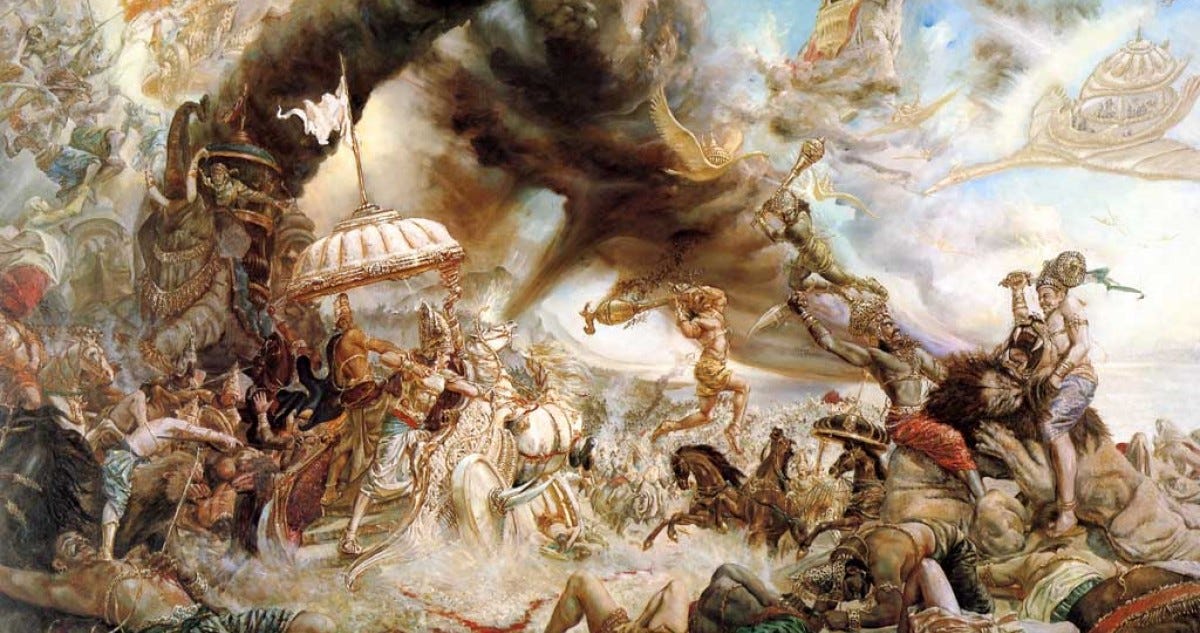






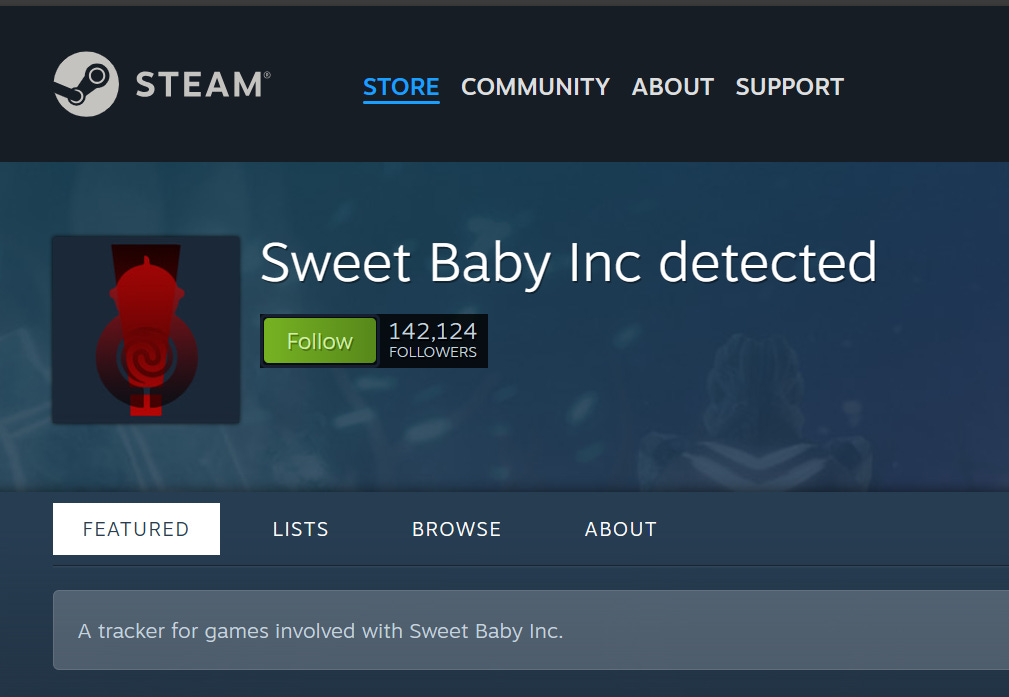

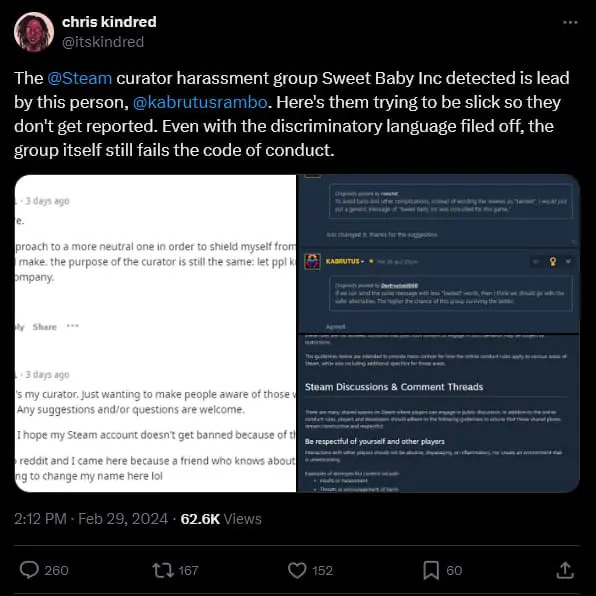
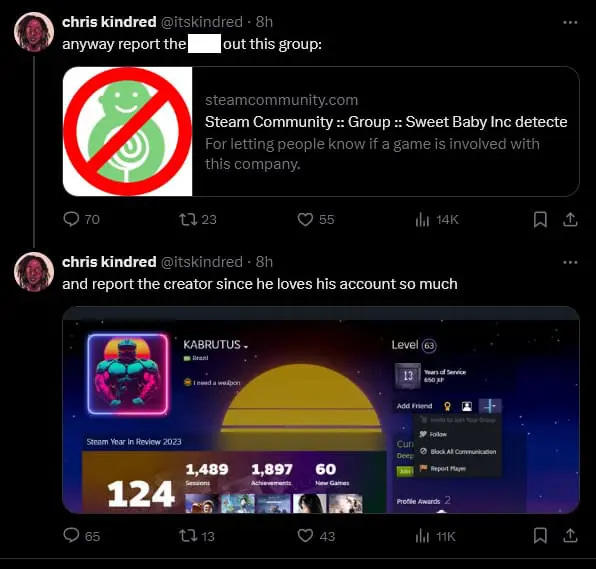
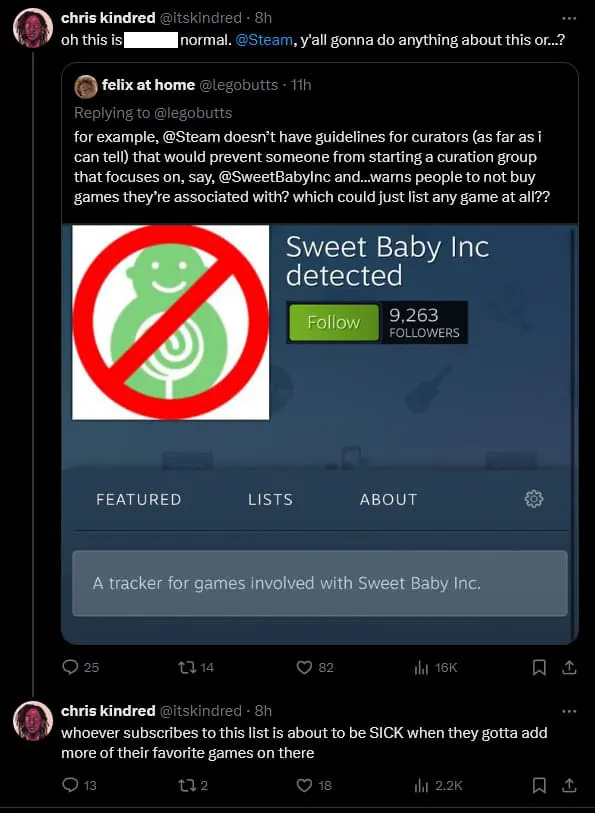

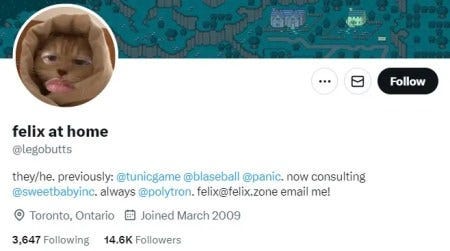


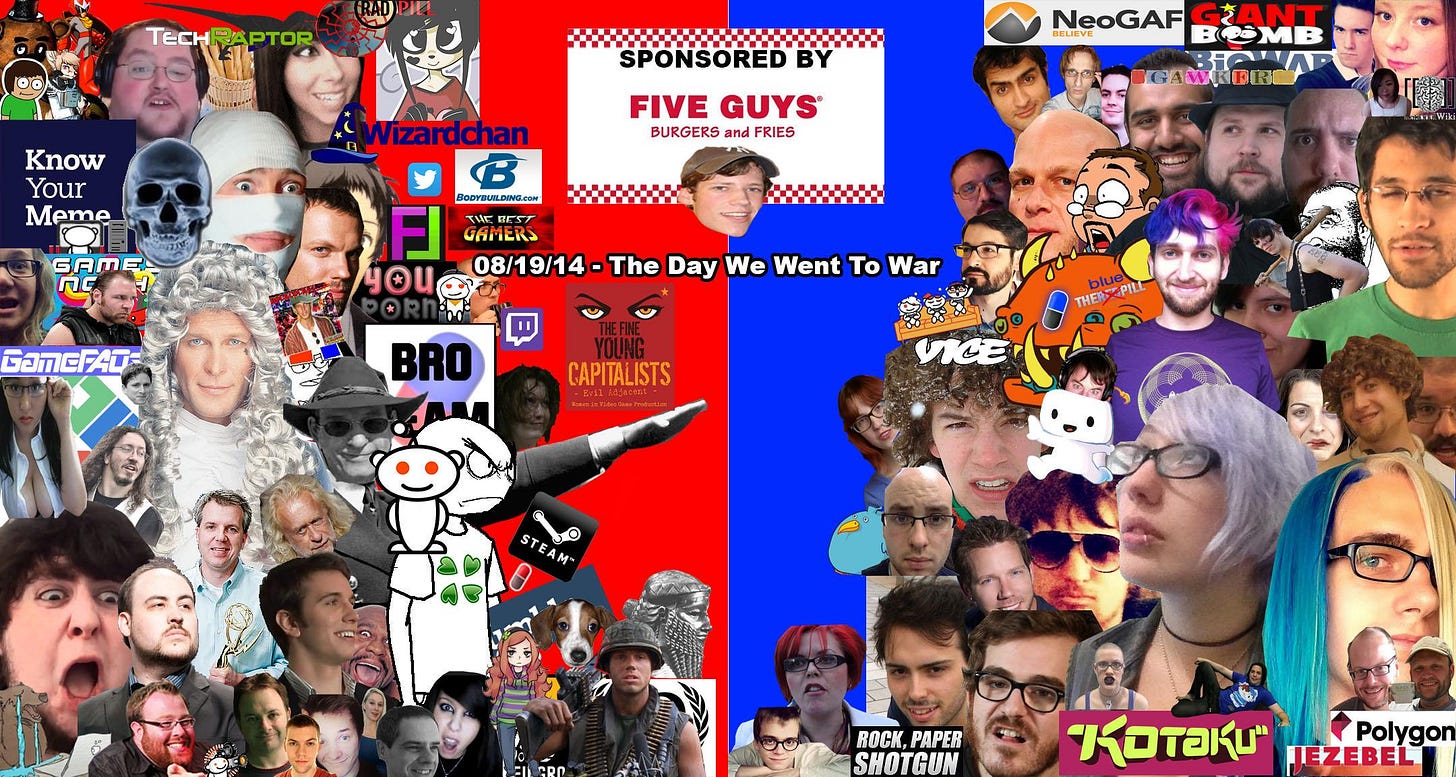



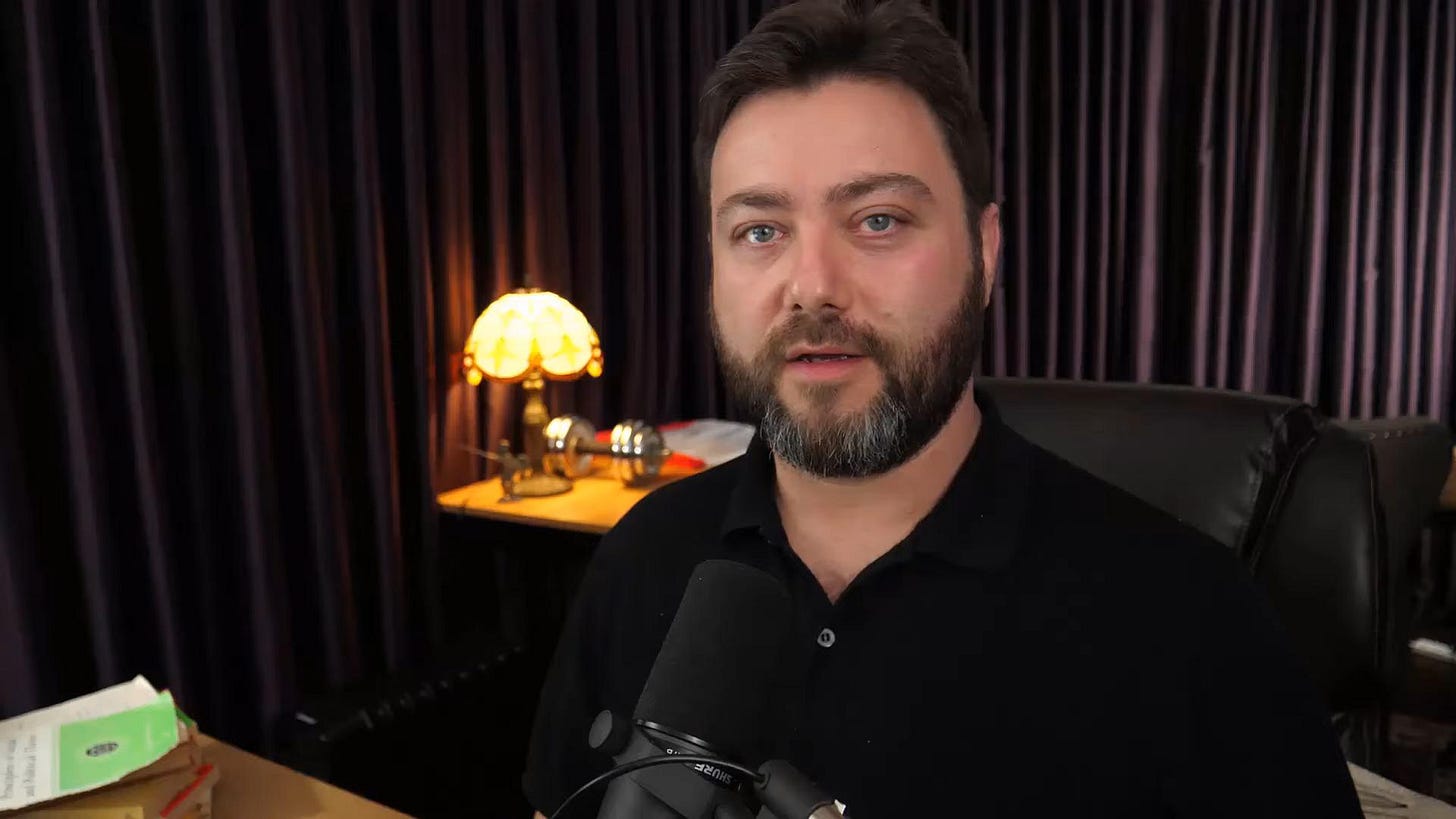



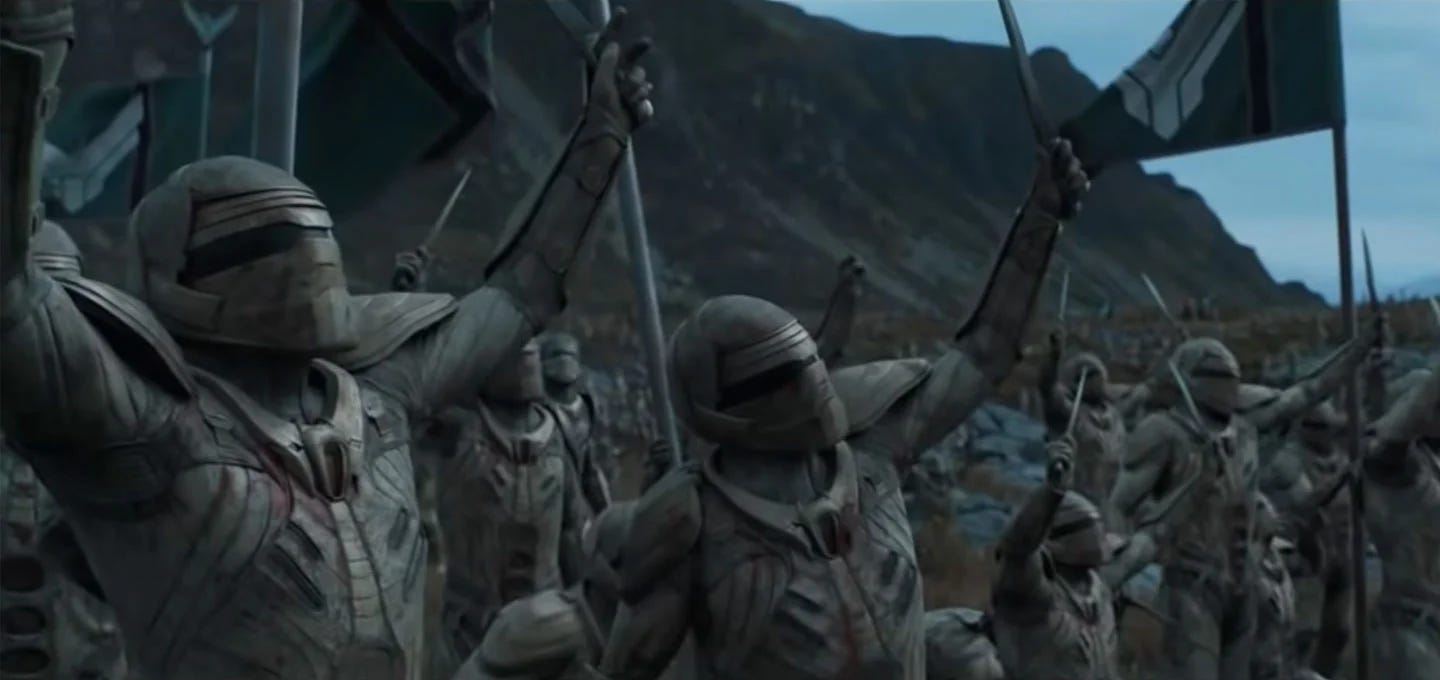
I can understand, in an abstract way, why Gamergate seems like such a big deal to those who took part, or who had front-row seats to it, as it were. It was, perhaps, the first time that people of a certain age noticed the effects of inimical cultural forces on something that they knew well and cared about. And it went on at a time when what we once quaintly called "Web 2.0" had just managed to consume most everyone. So it was an early sign of social and discursive tendencies that would become even more manifest in 2015-2016, and indeed, ever since.
I still can't grasp it in sentiment, though. I remember oblique references to "Gamergate" while it was going on, I guess. But I was doing other things: my last year of working for the black-helicopter people, pinning on lieutenant colonel, living with an infant in the house, etc. And the job that I just mentioned had given me an excellent excuse, a few years before, to stay off of social media (which I still referred to derisively as "Geocities 2.0" -- just to date myself further). So against that backdrop, maybe, you can appreciate why descriptions of Gamergate as some kind of apocalyptic struggle that "changed the face of Western culture" always strike me, at an emotional level, as silly.
I get that it prefigured the clash between the "alt-right" and the "Woke left" in the Trump years. But for some of us, "SJWs" were just the latest incarnation of "PC," something which had never really gone away in the 1990s (speaking as someone who was part of the federal bureaucracy throughout this period, the notion that PC had retreated at some point, only to return later for vengeance, is just false). From this vantage point, Gamergate was just an epiphenomenon, not a driving force. I suppose that it mobilized some people and primed them for 2016. The way in which Gamergate was conducted certainly foreshadowed the "alt-right" of that year.
But this statement is as negative as it is positive. Even if intellectually incoherent, the culturally and institutionally dominant group whose positions align with the mythologies of the Second World War and the Civil Rights Era is going to "win" in the way that they care about. Flaunting a willingness to break taboos and to do the thing that One Isn't Supposed To Do only get you so far. We see that the purportedly great victories in Gamergate and 2016 mostly came to naught. Read the Wikipedia page on Gamergate, if you want to see history as it was written by the real victors.
And as for the Eternal Return: don't worry about it. A meaningful answer would involve classical music and natural history, though, and this comment has already gone on too long. Thanks, though; I always appreciate your perspective on things like this, and you know more about them than I ever will.
The thing that made GamerGate and the broader meme war of that era so great was that it was fun. Most of my generation (X) tuned out of politics at a young age because the generation before us treated it as such tiresome Serious Business. Finding out that you could win battles with frog memes and ridicule was intoxicating. Not that GamerGate wasn't serious; as you pointed out, people lost jobs and even lives to the cancel crowd. But we found out that the enemy *hates* not being taken seriously and being laughed at, and the laughter drew in others who wouldn't have joined a too-serious effort.
I guess you can say the progressive scolds "won" if their goal was to stay employed while hiding from social media. I don't think that's what they expected when they set out to cancel all those loser gamers who offended them. I'd say the war just never ended; it went into a lull when the industry forces realized they needed to be more subtle. The gamers did pretty well in round one, considering they were up against the gaming industry, the media, the rest of Big Tech, and the social media companies. We'll see how they do in round two. It may not be as much fun this time, because now everyone is more aware of the stakes.